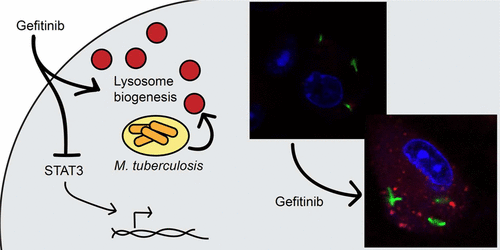当前位置:
X-MOL 学术
›
ACS Infect. Dis.
›
论文详情
Our official English website, www.x-mol.net, welcomes your feedback! (Note: you will need to create a separate account there.)
The Tyrosine Kinase Inhibitor Gefitinib Restricts Mycobacterium tuberculosis Growth through Increased Lysosomal Biogenesis and Modulation of Cytokine Signaling
ACS Infectious Diseases ( IF 5.3 ) Pub Date : 2017-06-05 00:00:00 , DOI: 10.1021/acsinfecdis.7b00046 Kimberly M. Sogi 1 , Katie A. Lien 2 , Jeffrey R. Johnson 3 , Nevan J. Krogan 3 , Sarah A. Stanley 1, 2
ACS Infectious Diseases ( IF 5.3 ) Pub Date : 2017-06-05 00:00:00 , DOI: 10.1021/acsinfecdis.7b00046 Kimberly M. Sogi 1 , Katie A. Lien 2 , Jeffrey R. Johnson 3 , Nevan J. Krogan 3 , Sarah A. Stanley 1, 2
Affiliation

|
Host-directed therapeutics have the potential to combat the global tuberculosis pandemic. We previously identified gefitinib, an inhibitor of EGFR, as a potential host-targeted therapeutic effective against Mycobacterium tuberculosis infection of macrophages and mice. Here we examine the functional consequences of gefitinib treatment on M. tuberculosis infected macrophages. Using phosphoproteomic and transcriptional profiling, we identify two mechanisms by which gefitinib influences macrophage responses to infection to affect cytokine responses and limit replication of M. tuberculosis in macrophages. First, we find that gefitinib treatment of M. tuberculosis infected macrophages inhibits STAT3, a transcription factor known to repress effective immune responses to M. tuberculosis in vivo. Second, we find that gefitinib treatment of M. tuberculosis infected macrophages leads to increased expression of genes involved in lysosomal biogenesis and function and an increase of functional lysosomes in gefitinib treated cells. Furthermore, we show that gefitinib treatment increases the targeting of bacteria to lysosomes, providing an explanation for the cell intrinsic effects of gefitinib treatment on M. tuberculosis infection. Our data provide novel insights into the effects of gefitinib on mammalian cells and into the possible roles for EGFR signaling in macrophages.
中文翻译:

酪氨酸激酶抑制剂吉非替尼通过增加溶酶体的生物发生和细胞因子信号传导的调节来限制结核分枝杆菌的生长。
寄主指导的疗法具有抗击全球结核病大流行的潜力。我们先前鉴定了吉非替尼(一种EGFR抑制剂)作为一种潜在的针对宿主的治疗药物,可有效对抗巨噬细胞和小鼠的结核分枝杆菌感染。在这里,我们检查了吉非替尼治疗对结核分枝杆菌感染的巨噬细胞的功能性后果。使用磷酸化蛋白质组学和转录谱,我们确定了吉非替尼影响感染的巨噬细胞反应以影响细胞因子反应并限制结核分枝杆菌在巨噬细胞中复制的两种机制。首先,我们发现吉非替尼治疗结核分枝杆菌被感染的巨噬细胞抑制STAT3,这是一种已知在体内抑制对结核分枝杆菌有效免疫应答的转录因子。第二,我们发现吉非替尼治疗结核分枝杆菌感染的巨噬细胞导致吉非替尼处理的细胞中溶酶体生物发生和功能相关基因的表达增加以及功能性溶酶体的增加。此外,我们显示吉非替尼治疗可增加细菌对溶酶体的靶向性,从而为吉非替尼治疗对结核分枝杆菌感染的细胞内在作用提供了解释。我们的数据为吉非替尼对哺乳动物细胞的作用以及巨噬细胞中EGFR信号传导的可能作用提供了新颖的见解。
更新日期:2017-06-05
中文翻译:

酪氨酸激酶抑制剂吉非替尼通过增加溶酶体的生物发生和细胞因子信号传导的调节来限制结核分枝杆菌的生长。
寄主指导的疗法具有抗击全球结核病大流行的潜力。我们先前鉴定了吉非替尼(一种EGFR抑制剂)作为一种潜在的针对宿主的治疗药物,可有效对抗巨噬细胞和小鼠的结核分枝杆菌感染。在这里,我们检查了吉非替尼治疗对结核分枝杆菌感染的巨噬细胞的功能性后果。使用磷酸化蛋白质组学和转录谱,我们确定了吉非替尼影响感染的巨噬细胞反应以影响细胞因子反应并限制结核分枝杆菌在巨噬细胞中复制的两种机制。首先,我们发现吉非替尼治疗结核分枝杆菌被感染的巨噬细胞抑制STAT3,这是一种已知在体内抑制对结核分枝杆菌有效免疫应答的转录因子。第二,我们发现吉非替尼治疗结核分枝杆菌感染的巨噬细胞导致吉非替尼处理的细胞中溶酶体生物发生和功能相关基因的表达增加以及功能性溶酶体的增加。此外,我们显示吉非替尼治疗可增加细菌对溶酶体的靶向性,从而为吉非替尼治疗对结核分枝杆菌感染的细胞内在作用提供了解释。我们的数据为吉非替尼对哺乳动物细胞的作用以及巨噬细胞中EGFR信号传导的可能作用提供了新颖的见解。


























 京公网安备 11010802027423号
京公网安备 11010802027423号